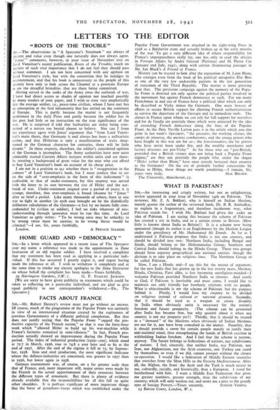WHAT IS PAKISTAN ?
SIR,—An interesting and crisply written, but not so enlightening, review appeared in your issue of November 14th on Pakistan. The reviewer, Mr. Z. A. Bokhari, who is himself an Indian Moslem, merely-quotes the author of the reviewed book, Dr. B. R. Ambedkar, to explain in a fragmentary, and therefore incoherent way, what Pakistan stands for. I wish Mr. Bokhari had given the _eader an idea of Pakistan. I am saying this because the scheme of Pakistan has created a stir in India, and to a certain extent in Britain. (How little is known about India in Britain!) It is a scheme now being sponsored (though its author is an Englishman) by the Moslem League under the presidency of Mr. Mohammed All Jinnah. As far as I understand it Pakistan proposes that India is not one country, and should be divided into two: Northern India, including Bengal and Sindh, should belong to the Mohammedan Group; Southern and Central India should belong to the Hindu Group. These two groups should form separate geographical and national entities, though the division is to take place on religious lines. The Northern Group to be called Pakistan.
Now, I am a Hindu and —1 say this for the matter of argument, for the new India that has grown up in the last twenty years, Moslem, Hindu, Christian, Parsi alike, is fast becoming unreligious-minded—I welcome Pakistan provided Northern India so chooses. And surely to God, if Pakistan is inevitable and must come, I would like to maintain not only friendly but brotherly relations with its people. What is objectionable is not the scheme of Pakistan, but the purpose
behind it. Firstly, I would hate my country to be divided on religious instead of cultural or national grounds. Secondly, that it should be used as a weapon to create disunity in India when obviously unity is necessary for the nation's freedom and future prosperity. (The scheme can be promoted after India has become free, but why quarrel about it when my country is not my property yet?) Thirdly, that it should be treated as a " demand " of the Moslems when obviously all Indian Moslems are not for it, nor have been consulted in the matter. Fourthly, that it should provide a cover for certain people merely to justify their anti-national stand, thus strengthening the hands of British reaction in withholding Indian freedom. And I feel that the scheme is narrow, anyway. The future belongs to federations of nations, not subdivisions of nations. I feel, sincerely, that neither India, nor Pakistan, nor Iran, nor Afghanistan, nor the Arab countries, nor Turkey can stand by themselves; or even if we did, cannot prosper without the closest co-operation. I would like a federation of Middle Eastern Countries that stretches from the Shan Hills to the Eastern Mediterranean. After all, the Afghan, the Irani. the Arab and the Turk is much nearer to me, culturally, racially, and historically, than a European. I stand for brotherhood with him. I want a Middle East Federation that gives me greater numbers, greater strength, than the subdivision of my country, which will only weaken me, and make me a prey to the greedy eyes of foreign Powers.—Yours sincerely, SURESH VAIDYA. 13 Barton Court, London, W. 1.


























 Previous page
Previous page